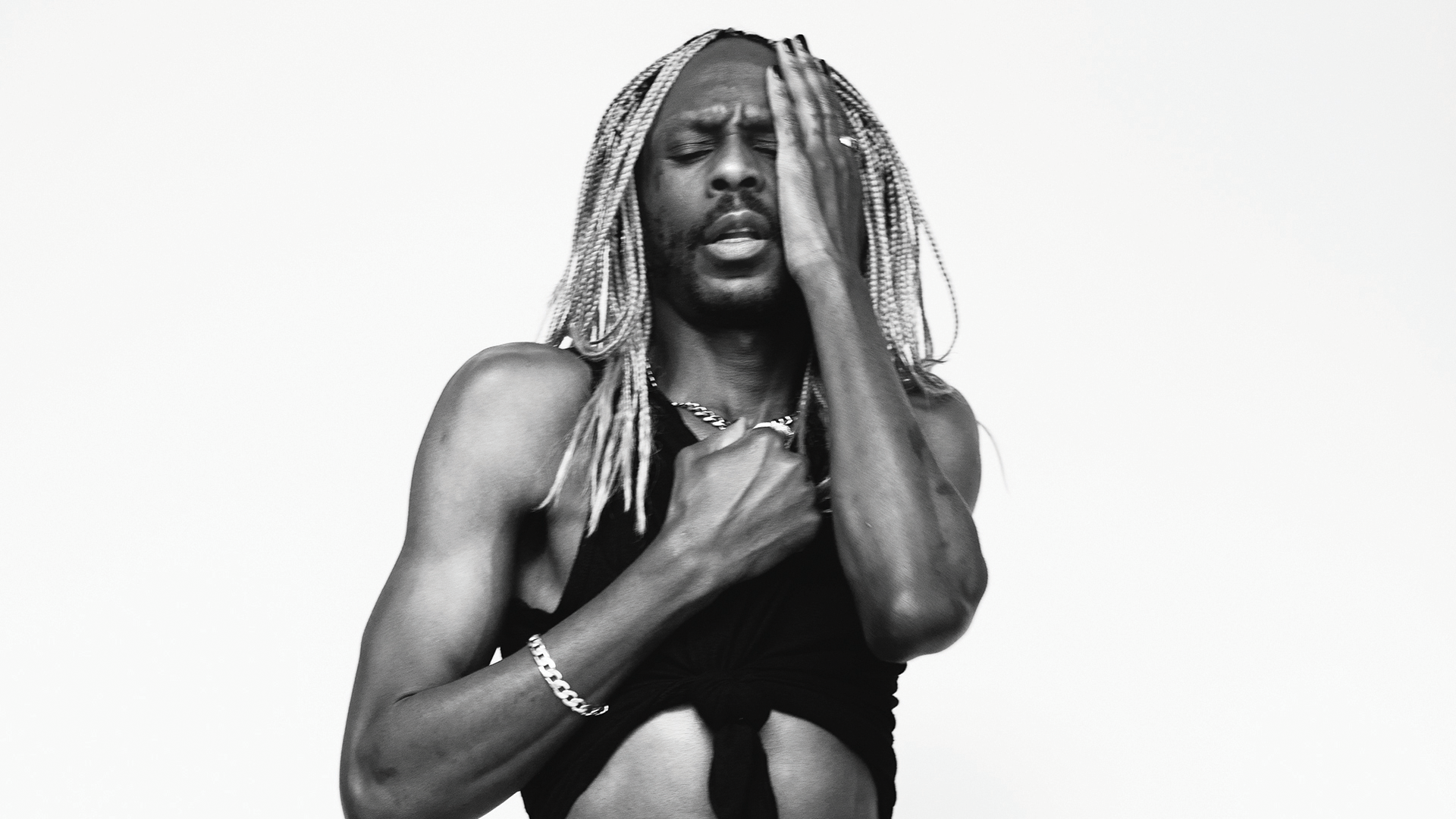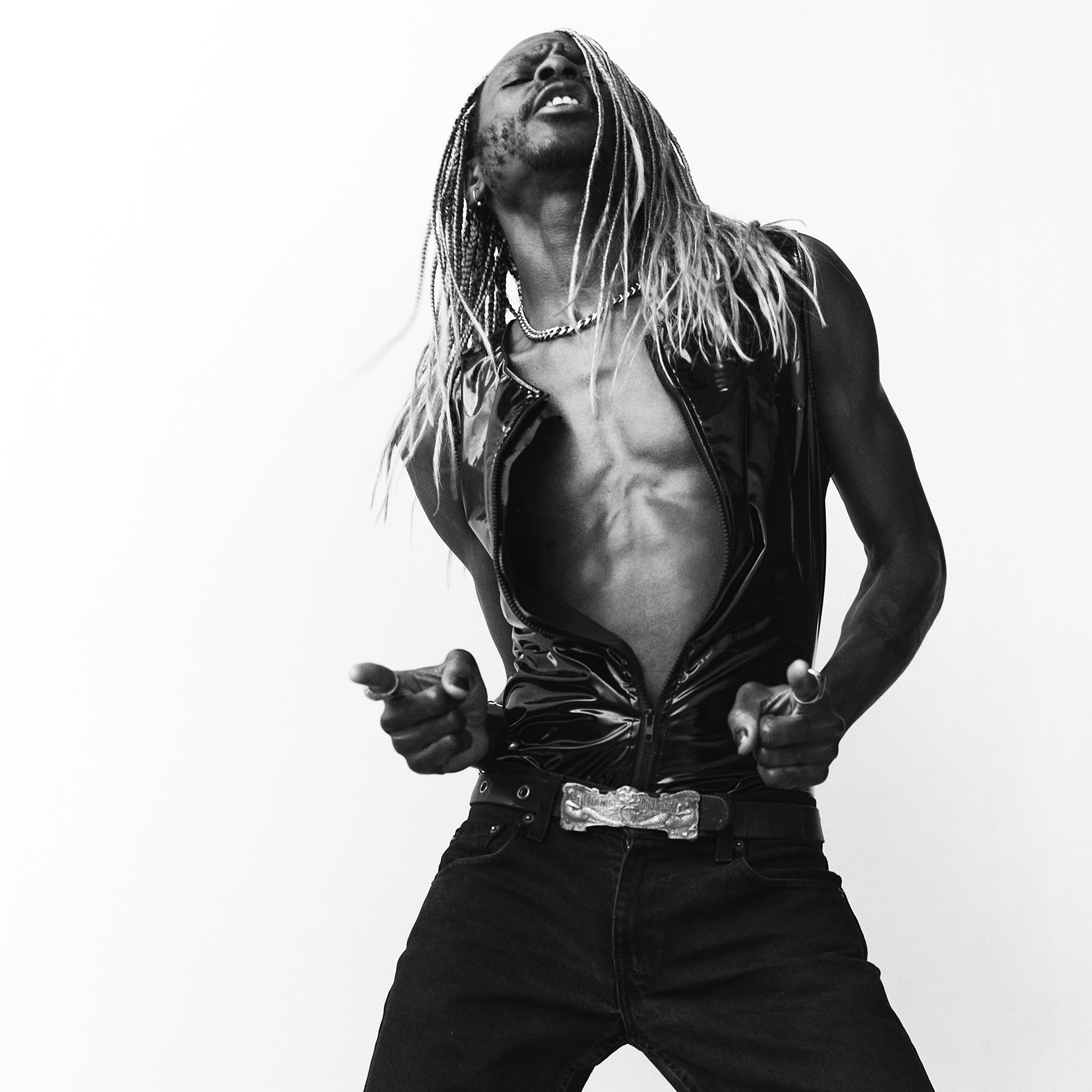Josh Caffé on bringing vocals back into house music: "You can count the vocalists that represent house in a really good way on the fingers of one hand"
With his edgy, vocal-led take on Chicago house, Josh Caffé tells all about his ambitious debut LP, Poppa Zesque

In Josh Caffé’s own words, “the sound of Chicago is embedded in me”. Over the past decade, the British-Ugandan DJ and producer has become an influential figure in London’s contemporary house scene, reframing past and present with his frenetic DJ sets and enigmatic-sounding releases.
Caffé’s exuberant vocal tones and productions can also be traced to collaborations with the legendary Robert Owens, Honey Dijon and, most recently, gritty acid house purveyors Paranoid London. Now signed to Erol Alkan’s Phantasy Sound label, Caffé’s debut LP, Poppa Zesque, takes his characteristically raw sound to new and decadent heights.
This week on MusicRadar, we've been taking a deep dive into how house music is made, so we caught up with Josh Caffé to find out more about how the genre has influenced his approach to production.
When you think of house music, does your mind travel back to the originators or those that may have followed and had a more direct influence on you?
“It definitely starts with the originators. When I started getting into house music in my late teens I was introduced to people like Jamie Principle and Robert Owens and fell in love with the music and sounds they made and what they stood for, especially from a queer black point of view. Those early vocalists and producers still shape a lot of the stuff that I do now.”
With that in mind, does any one house track appeal to you above everything else?
“I know it’s quite an obvious one but Jamie Principle’s Bad Boy is a track that I really liked. There’s a line that says, ‘You might call me a freak, you might call me a queer, but I’m just a bad boy,’ and because I was an outsider in the queer scene growing up and not fully into R&B or dance music, I’ve learned to embrace those things that he was expressing lyrically.”
Want all the hottest music and gear news, reviews, deals, features and more, direct to your inbox? Sign up here.
How do you think house music has evolved in recent decades?
“The sound of house has obviously naturally progressed, but the need for good voices and lyrics seems to have gone a bit – you can count good vocalists that represent house music in a really good way on the fingers of one hand. That’s something I’m trying to incorporate back into the music because a lot of the lyrics and songs from old house tracks really signified what was happening on the dancefloor and in the culture.”
Do you think that step-change has been a result of how people have drifted towards using electronic rather than acoustic sounds?
“I think so. It’s not a negative thing, but people are probably learning how to produce without factoring vocals into their house music productions. It does take a lot to work with a vocalist. It’s not just a case of someone turning up and singing; you need to understand the key, melody and how and where a vocal range sits. When people learn how to produce today, it seems to be more about experiment with genres, which is great, but the vocal element gets pushed aside.”
Prince is a hero of yours. He referenced various genres but always made them his own – is that what you’re also trying to achieve?
“A lot of people influenced me when making Poppa Zesque, from Prince to Kraftwerk, Grace Jones and Fingers Inc., and I wanted to combine all of those elements to create my own unique sound. Back in the day, Prince was very much creating sounds that hadn’t been made before while taking elements from rock, soul and jazz, and I wanted to add elements from the indie side.
“Working with Alex White from Fat White Family was really interesting because he brought in a lot of his knowledge of playing saxophone and guitar and putting them on house records, which is something you don’t see very often.”
You worked on the LP with Quinn Whally of Paranoid London. How did he help you to realise your vision?
“We both have a love for house music, proto-house and Prince. Quinn is also involved in so many projects and really understood where I wanted to go musically. Generally, I’d come in with a reference track, but there was never a ‘no’ moment, we’d just egg each other on to make the track better or explore things in a different way.
“I learnt a lot about production because, as a session vocalist with other producers, I hadn’t been given the chance to express my ideas, so it felt more like a partnership. We’d just have a laugh, get really pissed in the studio and the next day think, shit, did that actually sound good? But it usually did.”
Does sampling play a big role in your sound? If so, how do you approach sourcing and processing samples?
“We sampled a couple of things on the album even if we didn’t really want to do that at first. There’s a Man Parrish sample on the track Meine Lederjeans, and although sampling is not something that I’m massively into, when you find something that really works, it’s worth going with it.”
Are there various key elements that are important when making a house track?
“I would never want to make something that sounds obvious, so the house influence is much more of a subconscious thing. A loop is probably the key element that I start with and when I’ve got that structure there I’ll start writing things in my head that will dictate where the rest of the track goes.
“I don’t like writing songs in a standard verse/chorus format and prefer to work in a more abstract or poetic form. Although there is a formula that you have to take into account if you want your tracks to be playable in a club, I also want people to listen to them at home.”
Do you find that there are certain techniques that will help a track work better on a club sound system?
“If you’re making a more techno-led club record, then having a few less lyrics probably works better, as does understanding the timing of your drops, how long an intro should be for DJs mixing tracks and how to end a song. Once you get to understand those you can slowly work on building everything else up.
“It’s hard to answer what will sound good in a club because I’ve discovered that the tracks I’m not always feeling seem to end up being the ones that people like the most. I can’t explain it in terms of production, but my tracks seem to work better in a club when they don’t always fit together in my head.”

Do you use vintage instruments, drum machines/sequencers in order to create or supplement your rhythms?
“I didn’t want the album to sound too much like a Paranoid London record even though there were opportunities to use vintage hardware instruments and Quinn is a genius at working with them. I wanted there to be a separation from that and incorporate more live instruments, like guitar, saxophone and bass, which will lend well to my live shows.”
Do you have a home studio per se?
“This is the first time that I actually got to help on the production side rather than featuring as a vocalist on other people’s records, so I basically worked in Quinn’s studio and it was my first time getting stuck into Ableton Live. I wanted the sound to continue from the proto-house vibe of my 2018 single, The Adventures of Mr Freek. We made the album during lockdown and were in there pretty much every day. After a few weeks, we listened back and everything started to make sense and sit together nicely.”
On the DJ front, is house music still an integral part of your sets today?
“Nowadays, I play a much more eclectic mix. When I started out, I would play house sets inspired from ’90s New York and the Sound Factory or stuff that Danny Tenaglia, Junior Vasquez or Vibe Committee used to play, which I guess you could describe as ‘bitch house’.
“After a while, I started to feel more comfortable adding other elements into my sets. For example, I’ve been playing some drum & bass sets recently, which I never thought I’d get into. I don’t want to be known as just being a house DJ – I enjoy playing longer sets and like to take people on a journey.”
How far in advance do you plan your sets and what does that process entail?
“I play vinyl and CDJs, but tend to play vinyl a lot less now, so I’ve got rid of my decks at home. I’ve got quite a big library of music and I’m quite anal in how I organise my record box, so I’ll definitely sit down beforehand with everything arranged by genre ready for the night.
“When I’m DJing, I’ll just go through and pick things out that seem to be working. I can use Allen & Heath mixers or, preferably, Pioneer, but I’m happy to go with whatever the club provides. These days, it’s very rare that I get there and the gear hasn’t been looked after.”

